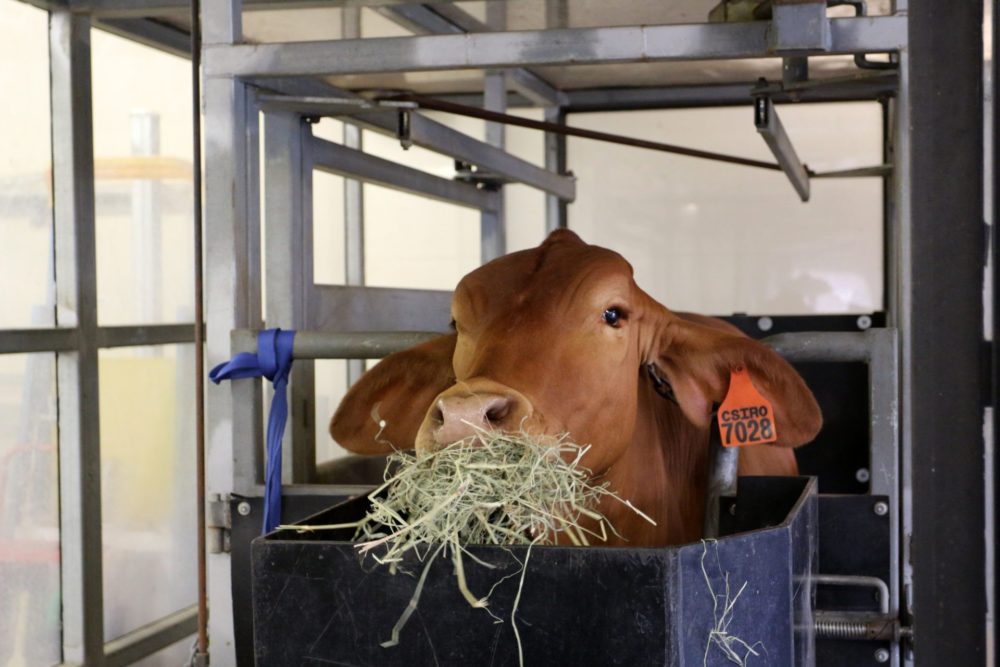Australia’s national research agency, the Commonwealth Scientific & Industrial Research Organization (CSIRO), will today announce the launch of a new business that the country’s government believes will be a “game-changer” in reducing livestock-related methane emissions.
Named FutureFeed, the company has raised A$13 million ($9.34 million) in funding from CSIRO and four other founding investors: retail giant and supermarket chain Woolworths, commodities handler GrainCorp, agrifood group Harvest Road, and accelerator operator AGP Sustainable Real Assets–Sparklabs Cultiv8 Joint Venture. Reports of the investment emerged earlier this week, but have not been confirmed by CSIRO until now.
The new company has grown out of a research program — also called FutureFeed — run by CSIRO, Meat & Livestock Australia, and James Cook University that has been developing an additive for livestock feed made from Asparagopsis seaweed. After running trials of the product in Australia and the US for the past five years, and with financial and strategic backing on board, the time has come to commercialize the technology.
Methane marvel
Livestock, and cattle in particular, are estimated to be the source of just over 14% of greenhouse gas emissions caused by human activity. The methane expelled by cows forms a significant component of these emissions.
Asparagopsis produces a compound called bromoform, which inhibits the enzyme in cows’ digestive systems that’s responsible for forming methane.
The discovery that Asparagopsis could have a calming effect on bovine belching came as something of a surprise, explains Duncan Ferguson, director of company creation at CSIRO.
Research teams exploring potential seaweed-based feed were flabbergasted when cattle fed with the genus — varieties of which grow in both tropical and temperate seas — showed a “massive reduction” in methane output, he says.
“They thought the results must’ve been wrong. So they ran [the trials] again and found the Asparagopsis species’ could reduce methane emissions by up to 80%.”
CSIRO immediately saw the commercial and environmental impact potential of such a discovery. But there was plenty of work still to do to turn that discovery into a viable product.
“The value chain isn’t as simple as just picking up the seaweed and feeding it to cattle. That’s why we brought these partners [FeedFuture’s founding investors] in,” Ferguson says.
“They have the expertise in feed formulation, feed systems, retail – and we’ve been working together to get Asparagopsis with the right level of bromoform into the mix to be effective when fed to the animals.”
Start big
It’s a relatively new commercialization model for CSIRO, which has previously focused on spinning-out and licensing its intellectual property, or more traditional industry collaborations, in its efforts to secure RoI from its research activities.
Ferguson heads up the agency’s company creation team, formed in the last few months, which looks to “bring the best of those two worlds together [by] starting with big market opportunities, co-founding new ventures with established companies, with [experienced] CEO founders” in place, he says.
“This is why we took this approach with FutureFeed. Rather than just raising capital and chasing venture returns, we’ve sought to stand this company up with the right strategic people round the board from its inception. AGP and Sparklabs bring expertise in the carbon market and startup investing, Graincorp brings grain supply chain and feed expertise on a global basis, Harvest Road have everything from aquaculture through to food processing, and Woolworths is on the retail and logistics end.”
The new company and its investors will seek to build a full value chain from the ground up for bromoform-infused cattle food, covering seaweed cultivation, processing, feed manufacturing, and distribution to the worldwide beef and dairy industries. By the middle of next year, FutureFeed expects to be supplying Australian beef and dairy farmers with its feed in commercial volumes.
“We set up an agtech fund to help make a difference. So when an opportunity like FutureFeed comes along you get really excited,” Malcolm Nutt, managing director at Wentworth Securities and partner at Sparklabs Cultiv8, told AFN.
“Participating in a project that reduces methane emissions and increases the productivity and returns to the farmer, is something we strive for. Sparklabs Cultiv8 is looking forward to engaging with the farmers and collaborating with our other partners, mentors, and investments to make FutureFeed one of the worlds leading agtech companies.”
‘Game-changer’
CSIRO estimates the global livestock industry’s greenhouse gas emissions could be cut by as much as 120 megatonnes each year if 10% of the world’s beef and dairy feedlots add FutureFeed to their cows’ menus. According to the agency, that’s the equivalent of removing 50 million gasoline-fuelled cars from the roads.
As indicated by Ferguson, the company will also be looking at ways to reward cattle farmers who adopt the seaweed supplement via greenhouse gas abatement payments.
“This is a game-changer — not only for livestock production, but also for our environment — with the potential to create an entirely new industry, while supporting jobs in the Australian agriculture sector,” said Australia’s Minister for Industry, Science, and Technology Karen Andrews in a statement.
“This is an example of what can be achieved when industry and researchers work together to solve real-world problems. “It also highlights the ongoing jobs and economic opportunities that can come from ensuring our world-leading research is commercialised.”
CSIRO chief executive Larry Marshall said FutureFeed enables “agriculture and the environment to be partners not competitors, helps overcome negative perceptions of the cattle industry, and gives Australian farmers an advantage in the global marketplace as first adopters of this Aussie innovation.”
He added, “FutureFeed is addressing some of the greatest challenges we face, including food security, sustainable production, and climate change, by turning science into a real product in the hands of business so they can turn it into jobs and economic growth. By earning equity in FutureFeed, CSIRO can continue to invest in great science for the future of industry.”
Got a news tip? Email me at [email protected]





